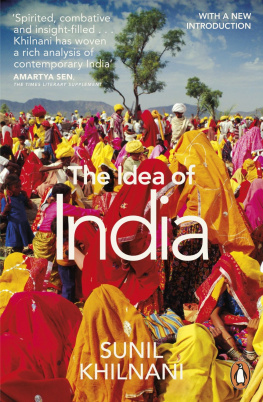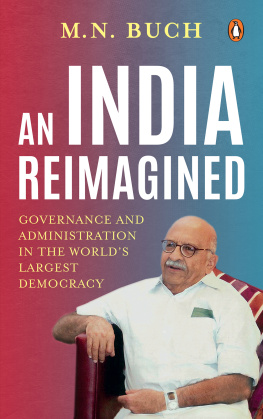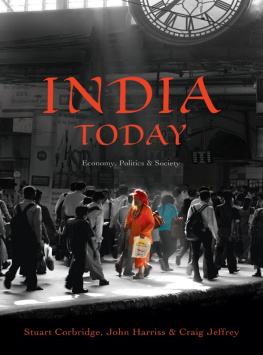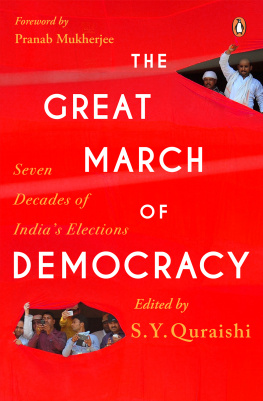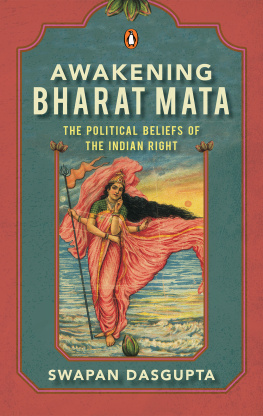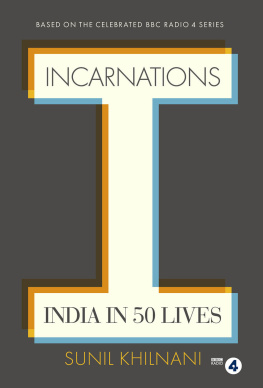SUNIL KHILNANI
The Idea of India
PENGUIN BOOKS
Contents
Introduction to the 2012 Edition
Introduction to the 2003 Edition
Preface
Map: The British Empire in India Before 1947
Map: India in 1997
INTRODUCTION: IDEAS OF INDIA
ONE: DEMOCRACY
TWO: TEMPLES OF THE FUTURE
THREE: CITIES
FOUR: WHO IS AN INDIAN?
EPILOGUE: THE GARB OF MODERNITY
References
Bibliographical Essay
ABOUT THE AUTHOR
Sunil Khilnani is Director of the King's India Institute and holder of the Avantha Chair at King's College London. Born in Delhi and educated at Trinity Hall and King's College, Cambridge, he was formerly founder and Director of South Asia Studies at the Johns Hopkins University School of Advanced International Studies in Washington DC. In addition to his critically acclaimed bestseller The Idea of India, he is author of Arguing Revolution: The Intellectual Left in Postwar France and co-editor of Civil Society: History and Possibilities. A columnist and frequent contributor to the Indian and international press, he and his wife, the writer Katherine Boo, divide their time between London, the US and India.
It is that market, of considerable attraction to international capital, which is today India's greatest comparative advantage and one that makes it a potential engine of the global economy.
SANJAY SARABHAI
In Memory
and for KATHERINE
PENGUIN BOOKS
THE IDEA OF INDIA
'Khilnani's disquisitions on India's democracy, economy, cities and identity are enthralling for their combination of scholarlyback ground, muscular argument and compelling prose If you were to choose one original work of non-fiction on India, Iwould unhesitatingly recommend Khilnani's'
Sunil Sethi, Financial Times
'Brilliantly perceptive Khilnani's book is written with verve and its clear arguments are plausible and stimulating it can beread with pleasure and profit even by those who have little knowledge of Indian politics'
Gordon Johnson, The Times Higher Education Supplement
'Khilnani writes with illuminating dexterity, wit and compassion, and India springs to life through his words the book is askilfully woven and compassionate analysis of India's troubled passages to modernity'
Judith Brown, The New York Times Book Review
'An eloquent, persuasive argument for Nehru's improvised, permeable sense of nationhood. If India loses this identity, it will bea much less attractive place to the outsider and, more importantly, to many of the people who live in it. Khilnani isdispassionate, scholarly, never sentimental. There is a crisp wit to his sentences and he is frank about his country'sfailings Brilliant'
Ian Jack, Observer
'A stimulating, subtle and wide-ranging work, which offers a sophisticated but convincing analysis of the way in which thecountry has developed during the last half-century the most interesting study of modern India that I have read for years'Patrick French, Literary Review
'Of all the books that could have been written with this title, this must be the most important and down to earth Authoritativeand elegantly written, Khilnani's book throws up some large ideas'
Sunday Times
'A masterful historical analysis of democracy in India since the achievement of Independence'
Patrick Skene Catling, Irish Times
'Compelling Not only a must read, but, with its sheer stylistic flamboyance, it can easily be categorized as unputdownable. Itshould be recommended reading not only for students of history and political science, but for all those who want to make senseof the current churning process'
Chandan Mitra, Pioneer
'A brilliantly compressed but elegant essay on the ideology, politics and culture of India after 1947. Khilnani has achieved theimpossible task of writing something that speaks both to the experts in the field, and to complete novices'
Noel Malcolm, Sunday Telegraph Books of the Year
'How are India's successes and failures related, and how can they be explained? Sunil Khilnani's elegant and well-arguedbook addresses these and related questions with erudition and insight'
Bhikhu Parekh, Independent
'No book has illuminated so clearly the assumptions on which India was first founded or the logic by which its historysubsequently proceeded'
Michael Kerrigan, Scotsman
Introduction
To the 2012 Edition
Why India? Why, of all post-colonial nations, is India the country that gets taken most seriously by the very powers it once struggled against? Whether it's corporate Britain wooing Indian money by throwing Bollywood bling parties at London's Claridge's Hotel or European luxury houses like Herms launching special sari lines for India's glamouratti or President Obama choosing the Indian Prime Minister as the guest of honour for his first state banquet the world wants a piece of India. Not since nineteenth-century America has an ex-colony moved so fast into prominence on the international stage.
Plenty of people have answers that purport to explain this phenomenon India's scale, its software and smartness, its strategic location. But I think the real answer is more subtle and more obvious. It has to do with the fact that India is still here that, unlike many new states created after the end of European empire, it has not self-destructed. What if India's current prominence has more to do with what it has avoided, steered around, than with what it has done?
When I wrote The Idea of India in 1997, I wanted to show that the founding idea of India is anchored as much in resisting certain powerful seductions the temptations for a clear, singular definition of nationhood, for the apparent neatness of authoritarian politics, for the clarities of a statist or pure market economy, for unambiguous alliances with other states as it was in realizing declaratory visions.
History moves fast these days faster that it did when nineteenth-century America began its climb to world power, faster than when Gandhi and Nehru brought India to Independence in the mid-twentieth century, and faster still than in the years since I wrote this book. In India, what were once gradual changes the upswing of economic growth, the movement of Indians from the countryside to the city, the sabotage of the old hierarchies of the social order, the renegotiation of India's place and status in the world now turn at dizzying pace.
Such historical fast-tracking has taken India to a point where it is now possible to envisage a real change in the chronic conditions of deprivation and injustice that have so long entrapped most Indians. Actually altering those conditions for the better will, however, require a run of political judgement and action as momentous as that accomplished by India's founders in the mid-twentieth century, when that remarkable generation broke India free from an authoritarian, oppressive past and set it forth in pursuit of liberty and democracy.
The grand tasks of the years ahead are daunting: managing the largest-ever rural-to-urban transition under democratic conditions; developing the human capital and sustaining the ecological and energy resources needed for participatory economic growth; contending with powerful competitor states and containing a volatile neighbourhood; defining what sort of power we wish to be in the world. It's an agenda that would test any society at the best of times. But in India's case, these tasks will have to be achieved under severe constraints of time and choice.
Next page
